Vice-Chancellor’s Prize for Best Doctoral Thesis
This prize is awarded annually to the five most exceptional theses successfully completed during the previous year.
Criteria for nomination include the demonstrable significance, originality, contribution and excellence of the thesis.
Congratulations to the 2024 winners
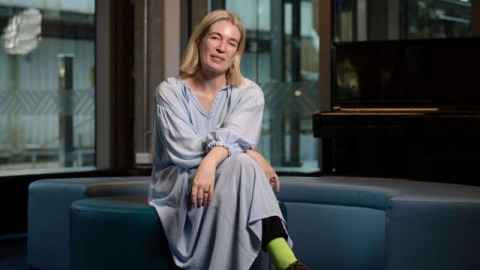
Dr Sarah Foster-Sproull
Faculty of Arts and Education (Dance Studies Programme)
Thesis: Vibrant Dance Power: Locating Vital Materialist Incantations of Thing-Power in Feminist Choreography
Main supervisor: Professor Ralph Buck
Co-supervisor: Dr Rose Martin
Originally from Dunedin, Sarah is Deputy Head of Department and a Senior Lecturer in Dance Studies in the University of Auckland’s Faculty of Arts and Education. She also runs a dance company called Foster Group and is Choreographer in Residence at the Royal New Zealand Ballet Company.
Her doctoral research focused on the democratisation of the choreographic process as a co-creation between humans, non-human elements (such as set design and scenographic components) and more-than-human elements (energies of the choreography, the feel of the space, and the ancestry, ideas, and lineages that channel through the articulate bodies of the performers). "I created an hour-long choreography with two dancer-collaborators, Rose Philpott and Tamsyn Russell, that captures core philosophical concepts of the research, and it toured nationally and internationally," she says.
Sarah has recently been learning craft skills to extend her appreciation of hand work and enhance her choreographic eye. “I have taken shoe making, jewellery and raranga kete courses, and now I am hooked on ceramics,” she says. “I also have a long practice of embroidery learned from my grandmother Jean and painting inspired by my mother Elizabeth and sister Charlotte.”
Her advice to doctoral candidates is to give thanks to the people who support your research journey. “They too are along for the ride, and the success you have with the research connects with this community of people too,” she says. “Give wild, frequent, and generous praise to these people.”
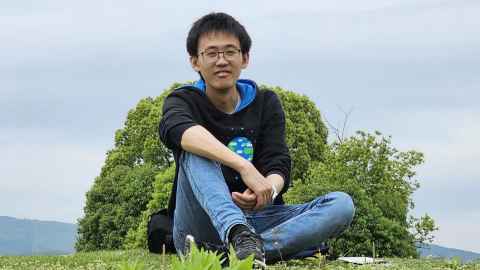
Dr Zongda Li
Faculty of Science (Department of Physics)
Thesis: Temporal Cavity Solitons Driven in the Near-Zero and Normal Dispersion Regimes
Main supervisor: Professor Miro Erkintalo
Co-supervisors: Dr Ray Xu, Professor Stuart Murdoch, Professor Stephane Coen
Zongda first came to Auckland from Guangzhou, China, for his undergraduate studies, and has been here ever since. He is now working as a research fellow in the Department of Physics in the University of Auckland’s Science Faculty.
His PhD research looked into a type of nonlinear optical structure known as the temporal cavity soliton. These are ultrashort pulses of light that can circulate indefinitely in an optical resonator (such as a ring of fibre) under suitable conditions. "They are arguably one of the most important optical phenomena discovered in the 21st century," he says, "with diverse applications, from high-precision spectroscopy to artificial intelligence."
During his doctorate, Zongda was part of a team that discovered a completely new form of cavity soliton, which has a number of advantages over conventional cavity solitons. He now hopes to receive a Fellowship that will allow him to work on a new project.
His advice to doctoral candidates is to be more proactive and take control of your own research rather than taking orders from your supervisor. “This way, you will not only be more motivated to work on the project, but it will also be more fulfilling when you complete the objectives that you envisioned yourself,” he says. “This is also good practice in project design, which will be of the utmost importance in your post-PhD career, whether you pursue academia or industry.”
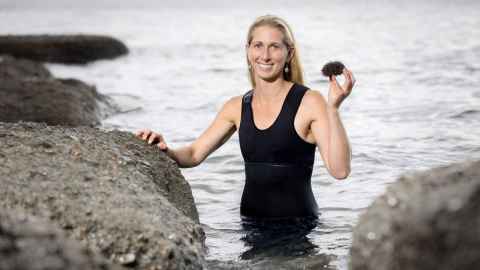
Dr Kelsey Miller
Faculty of Science (Institute of Marine Science)
Thesis: Evaluating Large-Scale Sea Urchin Removal as a Potential Tool for Restoring Kelp Forests
Main supervisor: Dr Nick Shears
Co-supervisors: Dr Richard Taylor
Kelsey, who hails from North America, is currently doing a Post Doc in kelp restoration at the University of Auckland’s George Mason Centre for the Natural Environment. She loves spending time in the ocean and is looking forward to going diving and surfing in Haida Gwaii (British Columbia) and Alaska later this year.
Her doctoral research showed that within kina barrens (areas where sea urchins have eaten all the kelp), kelp restoration can be rapid when kina densities are reduced sufficiently.
“While this recovery potential is very exciting, it highlights the deeper issue: this strategy only addresses the symptoms, rather than the cause, such as loss of sea urchin predators,” she says. “Therefore, sea urchin removal is most effective when used as part of a broader restoration strategy that combines both active (sea urchin removal) and passive (protection of predators) approaches.”
Kelsey’s advice to doctoral candidates is to find the things you love doing during your PhD. “There will always be challenges, but having people to laugh with and share the journey makes a huge difference,” she says. “Helping others with their research can teach you valuable skills, build great friendships, and lead to unforgettable experiences.”
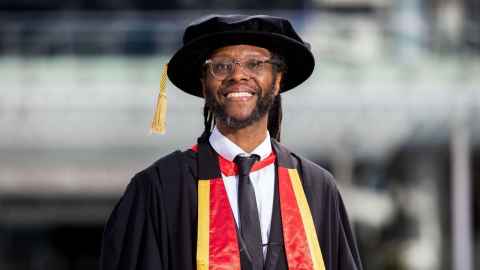
Dr Justin Sobion
Faculty of Law
Thesis: Earth Trusteeship – A Framework for a More Effective Approach to International Environmental Law and Governance
Main supervisor: Professor Klaus Bosselmann
Co-supervisor: Associate Professor Timothy Kuhner
Justin, who grew up in Trinidad and Tobago, is a Senior Tutor at the University of Auckland’s Law Faculty. He is also working on a book proposal to transform his PhD into a book, and is preparing for overseas speaking engagements in Bhutan, Italy and the UK.
He represented two Caribbean countries (Grenada and Saint Vincent & the Grenadines) at the International Court of Justice in 2024, so he is hoping to travel to The Hague for the Court's decision on its advisory opinion on climate change later this year.
Justin’s doctoral research recognised that an Earth Trusteeship framework has the potential to create a new and effective approach to International Environmental Law and Governance, but he found there were limitations. “Since a modern State has helped to generate many of the ecological problems we experience today, could citizens ‘trust’ the State to act as a ‘trustee’ of the Earth?” he asks. “There must be a paradigm shift in thinking at the local and central government levels.”
His advice to doctoral candidates is to treat your PhD as a job, and pace yourself. “A PhD is a scholarly marathon, not a 100m sprint. Do not work seven days a week, as you will burn out... Listen attentively to your supervisors – it also helps to have informal sessions with them. Do something you love in between... and do not forget to spend some time with those you love."
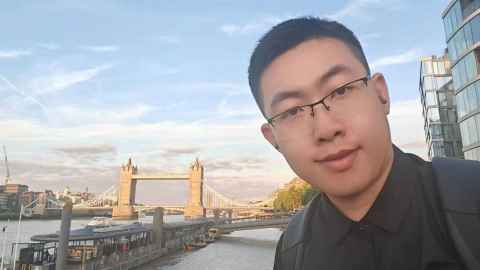
Dr Xiaofei Yang
Faculty of Engineering and Design (Department of Civil and Environmental Engineering)
Thesis: Automated Data Analysis for Bridge Visual Inspection using Deep Learning Techniques
Main supervisor: Dr Enrique del Rey Castillo
Co-supervisors: Professor Liam Wotherspoon, Dr Yang Zou
Xiaofei spent three years at the China National Testing Centre of Quality and Safety Supervision for Industrial Buildings and Structures before enrolling for a doctorate at the University of Auckland. “These real-world experiences revealed inefficiencies in conventional practices,” he says, “and motivated me to pursue a PhD to explore emerging technologies – particularly AI, digital twins, laser scanning, point cloud processing, computer vision in construction, and unmanned aerial system – to transform the field.”
His doctoral research centred on the development of an automated data analysis system for bridge visual inspection which enables predictive maintenance, extending the lifespan of critical infrastructure. After submitting his thesis, he took up a postdoctoral position at Nanyang Technological University in Singapore. He recently started a new postdoctoral role at New York University Abu Dhabi, where his research centres on AI-driven, unmanned underwater vehicle-based visual inspection of marine and offshore critical infrastructure. “I’m excited to explore more of the UAE – its rich cultural heritage, diverse landscapes, and iconic architectural landmarks," he says.
Xiaofei encourages doctoral candidates to ground their research in real-world challenges, as this provides a powerful sense of purpose and direction. “When you connect your research to tangible issues, you stay curious and motivated, and your work becomes inherently more impactful and personally meaningful,” he says. He also firmly believes that nothing can replace persistence. “A PhD is a marathon of problem-solving where you must embrace challenges as learning opportunities and remember that even small, incremental progress is a victory. This persistence should be paired with a commitment to excellence."
He recommends cultivating a diverse, international network. “This is essential not only for your professional development but also for gaining fresh perspectives, identifying new opportunities, and staying connected to the broader research world," he says. "Acknowledge your growth along the way, and you will emerge not just with a doctorate, but with resilience and a stronger sense of self.”
Congratulations to the 2024 nominees
- Lize Angelo: Faculty of Medical and Health Sciences (School of Medicine)
- Dr Leo Baldwin-Ramult: Faculty of Arts and Education (Fine Arts)
- Dr Charles Cayrat: Faculty of Business and Economics (Management and International Business)
- Dr Saahil Chand: Faculty of Engineering and Design (Mechanical Engineering)
- Dr Chuanjie Chen: Faculty of Science (Chemical Sciences)
- Dr Lincoln Dam: Faculty of Arts and Education (Te Puna Wananga)
- Dr Chad Drake: Auckland Bioengineering Institute
- Victor Gambarini: Faculty of Science (Biological Sciences)
- Robin (Sung Tyaek) Go: Faculty of Engineering and Design (Mechanical Engineering)
- Benjamin Lear: Faculty of Medical and Health Sciences (Medical Sciences)
- Dr Robin Murphy: Faculty of Medical and Health Sciences (Pharmacy)
- Dr Carolina Panico: Faculty of Arts and Education (Social Sciences)
- Dr Juliana Tong: Faculty of Science (Chemical Sciences)